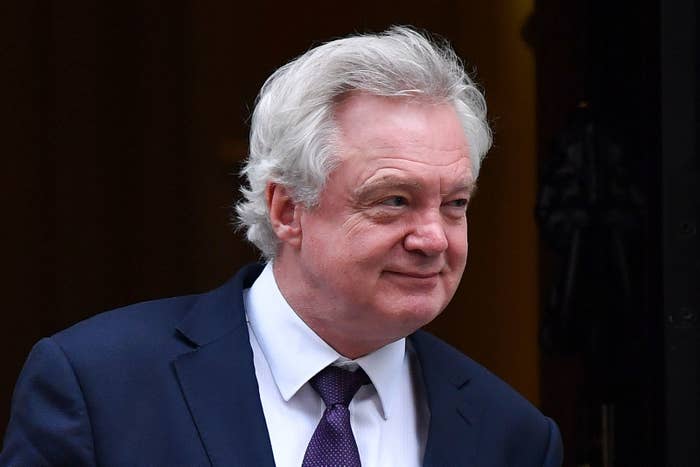
A long-running dispute about the government's assessment of the impact of Brexit descended into a confusing procedural mess on Tuesday.
For months, MPs on parliament's Exiting the European Union committee have been pushing David Davis to release dozens of studies carried out by his Brexit department on the impact of leaving the EU on various sectors of the UK economy.
Those impact assessments were meant to be provided to the committee on Monday, after parliament passed a motion at the start of this month ordering the government to turn over the documents.
Rather than providing clarity on the consequences of Brexit, however, the deadline left only more confusion, with the debate descending into rancorous fight about parliamentary sovereignty and executive accountability.
Too much "clever dickery by ministers" had backfired, the former UKIP MP Douglas Carswell tweeted. The government has left itself in a tangle entirely of its own making, said Labour's Pat McFadden. Tom Brake, the Liberal Democrat MP, added: "This whole farce has descended into a scene straight out of Yes Minister."
Instead of the dozens of impact assessments the MPs had expected, Davis's department provided a single 850-page document in hard copy that gave only a pared-back version of the government's analysis. Ministers said they could not provide all their analysis because some of it was so sensitive that disclosing it would jeopardise Britain's position in the Brexit negotiations.
Furious MPs accused the government of defying the parliamentary vote. Keir Starmer, Labour's Brexit spokesman, urged the speaker to hold the government in contempt. Even Eurosceptic Tory backbenchers broke ranks to criticise the government for not providing the full documents.
Adding to the confusion, though, ministers insisted they hadn't redacted or edited the documents because they didn't exist in the first place.
“Since the start of this process the Government has been clear that there are not, nor have there ever been, a series of discrete impact assessments arising out of our analysis of the 58 sectors,” Davis said in a letter to Benn.
But that is seemingly at odds with Davis's previous public comments.
The row about the impact assessments dates back to December last year, when Davis told the Brexit committee the government was "in the midst of carrying out about 57 sets of analyses".
View this video on YouTube
In June, appearing on the BBC's Andrew Marr Show, Davis said: "We've got 50, nearly 60 sectoral analyses nearly done."
In October, appearing again before the Brexit committee, Davis spoke again about 57 impact assessments. "They are in excruciating detail," he told the committee.
Asked whether Theresa May had seen the studies, Davis said: "She will know the summary outcomes of them. She will not necessarily have read every single one."
Between hearings, members of the Brexit committee lobbied for the government to release the papers, insisting the public had a right to know what impact officials have forecast Brexit will have on various sectors of the economy.
Labour's Seema Malhotra filed freedom of information requests that were rejected but at least the rejections seemed to acknowledge that the documents existed. Malhotra and her Labour colleague David Lammy arranged an open letter, signed by 120 MPS, calling on the government to release the assessments.
Today I have sent a letter to @DavidDavisMP with @SeemaMalhotra1 and over 120 MPs demanding to see @DExEUgov Brexit… https://t.co/nZklk29ijB
Ministers refused, insisting that publishing their assessments would undermine Britain's negotiating position. That view was bolstered by a December 2016 motion passed by parliament giving it leeway to withhold any information that, if made public, could be used against the UK in the talks.
At the start of November, opposition MPs put forward a motion in the Commons calling on Davis to provide the documents to the Brexit committee, using an obscure procedure known as a "humble address". The motion passed with the government putting up no opposition. The motion is binding.
A few days later, though, Davis wrote to Hilary Benn, the Labour MP who chairs the Brexit committee, saying that there weren't all those impact assessments after all.

Rather, the government held a "wide mix of qualitative and quantitative analysis, contained in a range of documents developed at different times since the referendum". Davis added: "It is not, nor has it ever been, a series of discrete impact assessments examining the quantitative impact of Brexit on these sectors. It is important that this is understood from the start."
It would take time, Davis told Benn, for the government to collate the analysis it had conducted into a format that the committee would find useful and accessible.
On Monday, it handed the committee and a House of Lords committee the distilled information in a folder of about 850 pages. MPs on the Brexit committee will be allowed to read the documents in private. It is not clear whether they will eventually be made public.
In a letter to Davis on Tuesday, Benn said he was "very concerned" that information had been withheld. That, he said, was contrary to the vote of parliament at the start of this month, and "potentially a breach of privilege".
Speaking in the Commons, Labour's Brexit spokesman Keir Starmer accused the government of treating parliament with contempt. "Transparency and accountability are two words this government does not understand," Starmer said.
Kenneth Clarke, the senior Conservative MP who supports staying in the European Union, said the government was treating parliament like “a debating chamber” and its decisions as if they are “the resolutions of some local tea party”.
Bercow, the speaker, told Davis to urgently meet Benn to resolve the deadlock.
"When it is suggested that that meeting should be soon, it means soon, it does not mean weeks hence," Bercow said. "It means very soon indeed."
Nothing else in Davis's diary is as pressing as satisfying the will of parliament, Bercow said. If that meeting fails to resolve the standoff, Bercow indicated, he would respond to opposition calls for the government to be held in contempt "very promptly".
The government now seems to have three options: face a censure for contempt, hand over everything it has to Benn, or try to force through another vote in parliament amending what it has to provide.

